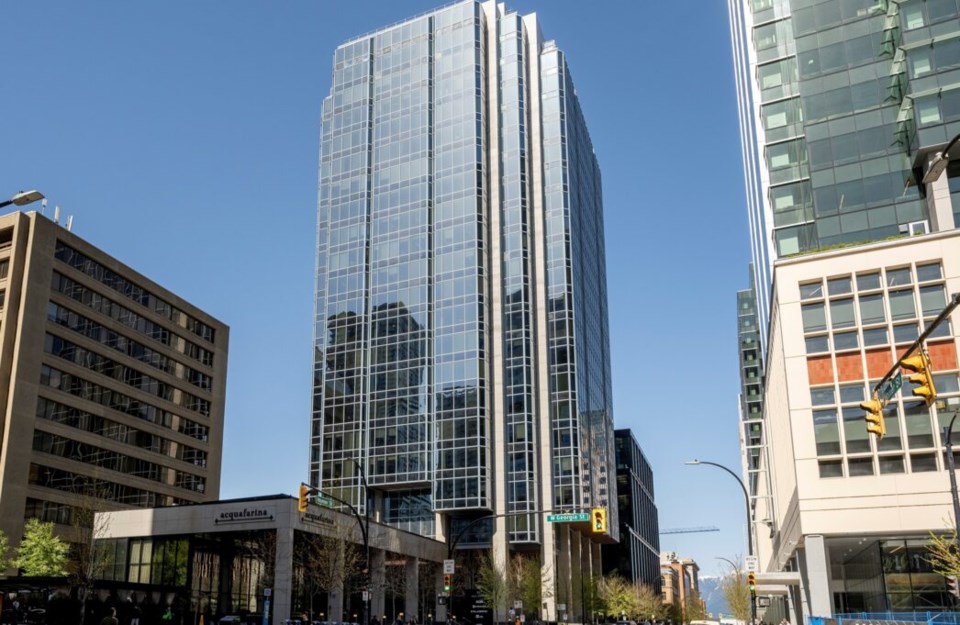Canadian institutional clients may be gearing up to re-enter the Vancouver office market, potentially squeezing out foreign groups enticed by higher cap rates.
Foreign buyers are still in the market and remain interested, said Michael Emmott, Vancouver-based capital markets principal with Avison Young (Canada) Inc.
But with domestic institutions increasingly drawn to top-tier office buildings, overseas investors may need to act now or risk losing out.
“Historically, certainly when the Canadian institutions re-enter the market and are actively bidding on that kind of product, it certainly becomes more difficult for the foreign buyers to compete,” Emmott said.
“That window … has not closed, but there are signs that it may close if the institutions do come back.”
Foreign investors have been drawn by slightly higher cap rates, which measure the relationship between a property’s income and the price it has sold for on the open market.
Cap rates in Vancouver’s office sector ranged from 5.25 to 6.25 per cent for downtown Class A office buildings in Q1 2025, compared to 4 to 4.5 per cent two years earlier, according to Colliers Canada.
If a significant landmark office building were put on the market today, it would likely attract significant interest from Canadian institutional purchasers, Emmott said.
“That is good to see again,” he said.
Last year, major office transactions included the sale of two downtown towers by Oxford Properties Group Inc. and Canada Pension Plan Investment Board to Germany’s Deka-Gruppe for $300 million, as well as the sale of a Mount Pleasant office building by Westbank Corp. to San Francisco-based Spear Street Capital for $115 million.
Even lower echelons of the market are seeing healthy activity. This past February, two 16-storey office buildings on West Pender Street were put on the market by The Cadillac Fairview Corp., which is wholly owned by the Ontario Teachers’ Pension Plan.
While they were Class B buildings and the auction was unlikely to attract institutions, the listing generated significant interest, Emmott said.
“Our understanding was there were multiple bids,” he said, adding that once the cap rate is known, it could be a cue for big players to get back into the game.
With leases expiring, the Canadian federal election out of the way, tariff concessions by U.S. President Donald Trump and return-to-office mandates, Vancouver’s office sector could overcome recent weakness.
The Greater Vancouver area office market began 2025 with a solid positive absorption level of 198,650 square feet and saw its first decline in the vacancy rate of 9.4 per cent since 2022, said Colliers Canada’s Q1 2025 Vancouver office report.
Adam Jacobs, Toronto-based head of research with Colliers, said the big story is the “splitting” of the market.
“The suburbs have been doing better than downtown, and downtown has some challenges,” he said.
“The really premium brand-new offices, you know The Stack and B6, those kinds of offices are just rocking and rolling. They are really, really, really full. But they are kind of drawing tenants away from maybe the more established offices that have been there 30, 40 years.”
Some older office buildings can get a new lease on life as hotels, as a strong hospitality sector stokes interest in office-to-hotel conversions.
In late March, Vancouver’s Reliance Properties and Montreal’s Germain Hotels launched a proposal that would convert a 12-storey office building at 1111 W. Hastings St. into a 180-room boutique hotel.
Expected to open in 2029, the project would benefit from land-use regulations that do not require rezoning. With several other high-vacancy office buildings also under this designation, more conversions could follow.
“I would say hospitality is one area that has actually sort of benefited from the trade war,“ said Colliers’ Jacobs.
“Canadian restaurants, Canadian hotels, travel to B.C. [are] doing really well as an alternative to people going to the U.S.”



